Hyperpigmentation is a common skin condition characterized by dark patches or spots on the skin. It can be caused by various factors such as sun exposure, hormonal changes, acne scars, and skin injuries. Many individuals seek effective ways to reduce or eliminate hyperpigmentation to achieve a more even skin tone. In this article, we will explore the best and fastest methods to get rid of hyperpigmentation, discuss suitable creams for dark pigmentation, explore natural remedies for lightening hyperpigmentation, and provide tips for reversing and fading stubborn hyperpigmentation on black skin.
What is Hyperpigmentation?
Hyperpigmentation refers to the darkening of the skin due to an increase in melanin production. Melanin is the pigment responsible for giving color to our skin, hair, and eyes. When the production of melanin is excessive or unevenly distributed, it can lead to hyperpigmentation.
Hyperpigmentation can manifest in various forms, including:
- Melasma: Commonly known as the “mask of pregnancy,” melasma is a type of hyperpigmentation that appears as brown or grayish patches on the face, particularly the cheeks, forehead, and upper lip.
- Post-inflammatory hyperpigmentation (PIH): This type of hyperpigmentation occurs as a result of skin injuries, acne, or other inflammatory conditions. It appears as dark spots or patches on the affected areas.
- Sunspots: Also known as solar lentigines or age spots, sunspots are caused by prolonged exposure to the sun’s harmful UV rays. They typically appear on sun-exposed areas such as the face, hands, shoulders, and arms.
- Freckles: Freckles are small, concentrated areas of increased melanin production. They are often genetic and more common in individuals with fair skin.
What Causes Hyperpigmentation to Fade?
Hyperpigmentation can fade naturally over time, but the process can be accelerated with proper treatment and care. Several factors contribute to the fading of hyperpigmentation:
- Skin cell turnover: Our skin naturally sheds dead cells and replaces them with new ones. This turnover process helps to gradually fade hyperpigmentation.
- Protection from sun exposure: UV rays can worsen hyperpigmentation and make it more difficult to fade. Protecting the skin from sun exposure with sunscreen and wearing protective clothing can prevent further darkening and aid in the fading process.
- Treatment methods: Various treatment options, such as topical creams, chemical peels, laser therapy, and microdermabrasion, can help speed up the fading of hyperpigmentation.
What Cream is Good for Dark Pigmentation?
Using the right cream for dark pigmentation can effectively lighten the skin and reduce hyperpigmentation. Here are some recommended creams that have proven to be effective:
- Hydroquinone: Hydroquinone is a skin-lightening agent that inhibits the production of melanin. It is commonly used to treat hyperpigmentation, including melasma and sunspots. However, it’s important to note that hydroquinone should be used under the guidance of a dermatologist, as prolonged use or misuse can cause side effects.
- Kojic acid: Kojic acid is derived from fungi and has skin-lightening properties. It inhibits the production of melanin and can be found in various skincare products designed to target hyperpigmentation.
- Retinoids: Retinoids, such as tretinoin and retinol, promote cell turnover and can help fade hyperpigmentation over time. They are often used in combination with other skin-lightening agents.
- Vitamin C: Vitamin C is an antioxidant that helps brighten the skin and reduce hyperpigmentation. It inhibits melanin production and promotes collagen synthesis, leading to a more even skin tone.
- Azelaic acid: Azelaic acid is another effective ingredient for treating hyperpigmentation. It works by reducing the production of melanin and has anti-inflammatory properties.
It’s essential to consult with a dermatologist or skincare professional to determine the most suitable cream for your specific skin type and condition.
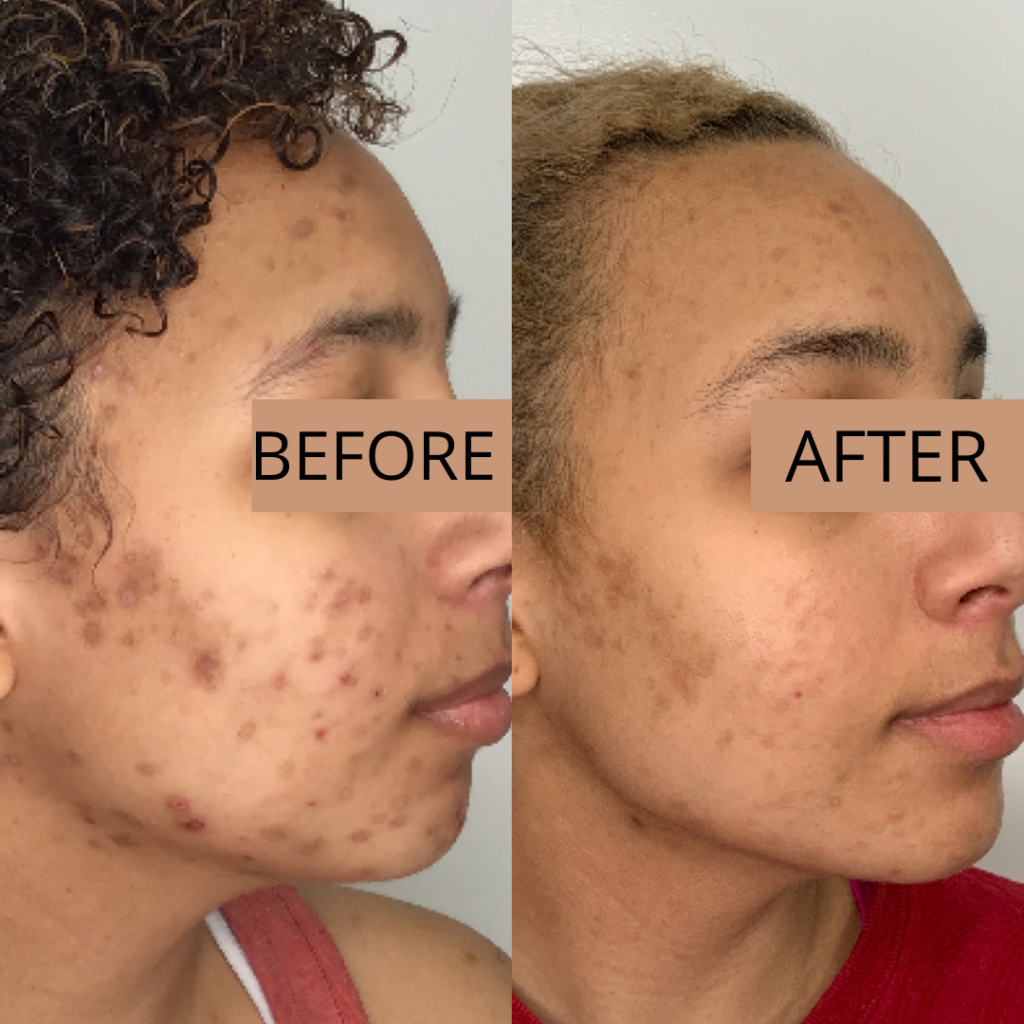
How Can I Lighten My Hyperpigmentation Naturally?
While there are several creams and treatments available, some individuals prefer natural remedies for lightening hyperpigmentation. Here are some natural ingredients and methods that can help:
- Lemon juice: Lemon juice contains citric acid, which has natural bleaching properties. Applying fresh lemon juice to the affected areas can help lighten hyperpigmentation. However, lemon juice can be drying, so it’s important to moisturize the skin afterward and avoid sun exposure.
- Aloe vera: Aloe vera has soothing and healing properties. Applying aloe vera gel directly to hyperpigmented areas can help fade dark spots over time.
- Green tea extract: Green tea contains antioxidants that can help reduce hyperpigmentation. Applying cooled green tea extract to the skin or using skincare products containing green tea can have a brightening effect.
- Turmeric: Turmeric has long been used in traditional medicine for its skin-brightening properties. Creating a paste with turmeric powder and water or honey and applying it to the skin can help lighten hyperpigmentation.
- Milk: The lactic acid present in milk acts as a mild exfoliant and can help fade hyperpigmentation. Soaking a cotton ball in milk and applying it to the skin can gradually lighten dark spots.
It’s important to note that natural remedies may take longer to show results compared to medical treatments. Consistency and patience are key when using natural methods.
How Do You Reverse Hyperpigmentation on Black Skin?
Hyperpigmentation on black skin can be challenging to reverse due to the higher melanin content. However, with the right approach and suitable treatments, it is possible to fade hyperpigmentation effectively. Here are some tips for reversing hyperpigmentation on black skin:
- Consult a dermatologist: It’s crucial to seek professional advice from a dermatologist who specializes in treating skin of color. They can recommend appropriate treatments and products tailored to your specific needs.
- Avoid harsh treatments: Some treatments, such as certain chemical peels or laser therapies, may not be suitable for darker skin tones, as they can cause post-inflammatory hyperpigmentation or even hypopigmentation. Gentle and targeted treatments are usually recommended.
- Use sunscreen daily: Sun protection is essential for all skin types, but particularly for black skin prone to hyperpigmentation. Choose a broad-spectrum sunscreen with a high SPF and apply it generously to all exposed areas of the skin.
- Topical creams: As mentioned earlier, creams containing ingredients like hydroquinone, retinoids, or vitamin C can be beneficial for fading hyperpigmentation on black skin. However, it’s essential to follow the instructions provided by your dermatologist to avoid potential side effects.
- Professional treatments: In-office procedures, such as microdermabrasion or chemical peels specifically formulated for darker skin tones, can help exfoliate the skin and promote a more even complexion. These treatments should be performed by experienced professionals.
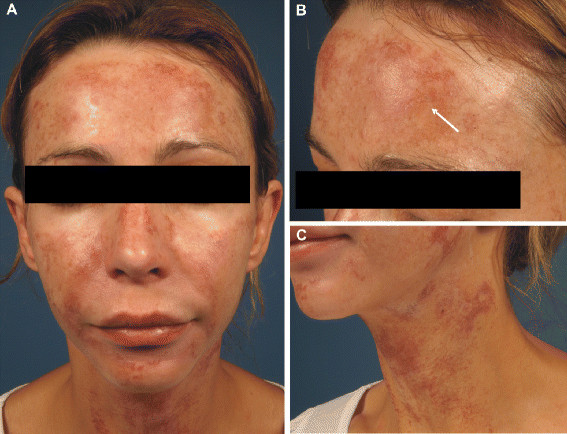
How Can I Remove Pigmentation from My Face Permanently at Home?
Removing pigmentation from your face permanently at home requires a consistent skincare routine and the use of effective remedies. Here are some strategies you can incorporate into your daily regimen:
1. Protect Your Skin from the Sun
Sun exposure is a major contributor to pigmentation, so it’s crucial to protect your skin from harmful UV rays. Make sure to wear a broad-spectrum sunscreen with at least SPF 30 on a daily basis, even during cloudy days. Additionally, seek shade, wear protective clothing, and use wide-brimmed hats to minimize direct sun exposure.
2. Use Skin-Lightening Serums
One of the best ways to address pigmentation is by using skin-lightening serums. Look for serums that contain ingredients like vitamin C, kojic acid, licorice extract, and niacinamide. These ingredients have been shown to reduce melanin production and promote a more even skin tone. Apply the serum to the affected areas of your face twice a day for optimal results.
3. Incorporate Cucumber into Your Skincare Routine
Cucumber is a natural ingredient that is known for its soothing and cooling properties. It can also help reduce pigmentation when used consistently. To use cucumber for pigmentation removal, grate a fresh cucumber and apply the pulp directly to your face. Leave it on for 15-20 minutes, then rinse off with cold water. Repeat this process three times a week for visible improvements.
4. Maintain a Healthy Diet
Your diet plays a significant role in the overall health and appearance of your skin. To combat pigmentation, include foods rich in antioxidants and vitamins in your diet. Some fruits that are beneficial for reducing pigmentation include papaya, pineapple, and berries. These fruits contain enzymes and antioxidants that can help lighten pigmented areas and promote a more even skin tone.
5. Try Natural Herbs for Pigmentation
Certain herbs have been used for centuries to treat pigmentation and improve skin health. One such herb is turmeric. Its active compound, curcumin, has antioxidant and anti-inflammatory properties that can help reduce pigmentation and promote a healthy complexion. Create a paste by mixing turmeric powder with milk or honey and apply it to the affected areas. Leave it on for 20 minutes, then rinse off with lukewarm water.
6. Opt for Professional Treatments
While home remedies can be effective, some cases of pigmentation may require professional treatments for more significant and lasting results. Consult with a dermatologist or skincare professional to explore options such as chemical peels, laser therapy, or microdermabrasion. These treatments can target pigmented areas and help fade them over time.
Which Serum Is Best for Pigmentation?
When it comes to choosing a serum for pigmentation, there are several excellent options available. Look for serums that contain ingredients known for their skin-lightening properties. Here are some top serums for pigmentation:
- Vitamin C Serum: Vitamin C is a potent antioxidant that can help reduce pigmentation and promote a brighter complexion. Look for serums with a high concentration of vitamin C (around 15-20%) for optimal results.
- Kojic Acid Serum: Kojic acid is derived from certain fungi and is known for its skin-lightening properties. It inhibits melanin production, making it effective in reducing pigmentation.
- Niacinamide Serum: Niacinamide, also known as vitamin B3, has been shown to reduce the transfer of melanin to the skin’s surface. It can help fade pigmentation and improve overall skin texture.
- Licorice Extract Serum: Licorice extract contains a compound called glabridin, which has been found to have skin-brightening properties. It can help fade pigmentation and even out skin tone.
Remember to patch test any new serum before applying it to your entire face and follow the instructions provided by the manufacturer for best results.
Can Cucumber Remove Pigmentation?
Cucumber is a popular home remedy for various skincare concerns, including pigmentation. While cucumber can provide temporary relief and soothing effects, it may not be potent enough to completely remove pigmentation on its own. However, when used in combination with other remedies and a consistent skincare routine, cucumber can contribute to a reduction in pigmentation over time. Its hydrating and cooling properties can also provide a refreshing sensation to the skin.
To use cucumber for pigmentation, follow these steps:
- Grate a fresh cucumber or blend it into a pulp.
- Apply the cucumber pulp directly to the pigmented areas of your face.
- Leave it on for 15-20 minutes.
- Rinse off with cold water.
- Repeat this process three times a week for visible improvements.
Remember to be patient and consistent with this remedy, as natural ingredients often take time to show noticeable results.
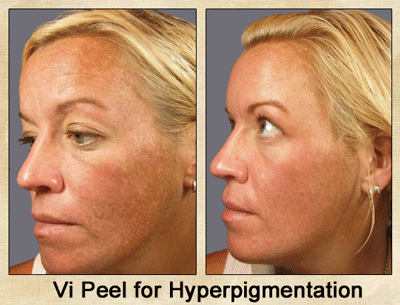
What Stops Pigmentation on Face?
Preventing pigmentation on your face involves taking proactive measures to protect your skin and address underlying causes. Here are some effective strategies to help stop pigmentation:
- Sun Protection: Protect your skin from harmful UV rays by wearing sunscreen daily, seeking shade, and using protective clothing and accessories.
- Avoid Irritants: Certain skincare products and ingredients can irritate the skin and trigger pigmentation. Avoid using harsh products or those that cause irritation or redness.
- Address Hormonal Imbalances: Hormonal changes can contribute to pigmentation. If you suspect hormonal imbalances, consult with a healthcare professional for appropriate treatment options.
- Manage Stress Levels: Chronic stress can exacerbate pigmentation. Practice stress management techniques such as meditation, yoga, or engaging in activities you enjoy.
- Maintain a Healthy Lifestyle: Adopt a healthy lifestyle that includes a balanced diet, regular exercise, and sufficient sleep. This can help support overall skin health and minimize the risk of pigmentation.
By incorporating these preventive measures into your daily routine, you can reduce the likelihood of pigmentation and maintain a more even complexion.
What Happens If I Rub Cucumber All Over My Face?
Rubbing cucumber all over your face can provide temporary relief and hydration to the skin. Cucumber has a high water content and contains various vitamins and minerals that can help soothe and refresh the skin. It may temporarily reduce redness, inflammation, and puffiness, providing a rejuvenating sensation.
However, it’s important to note that rubbing cucumber alone is not a cure for pigmentation or other skin concerns. For long-term results, it’s crucial to adopt a comprehensive skincare routine that includes cleansing, moisturizing, sun protection, and targeted treatments.
Which Fruits Remove Pigmentation?
Certain fruits are known for their skin-brightening properties and can help reduce pigmentation. Here are some fruits that can contribute to a more even skin tone:
- Papaya: Papaya contains an enzyme called papain, which acts as a natural exfoliant. It can help remove dead skin cells and promote a brighter complexion, thereby reducing pigmentation.
- Pineapple: Pineapple contains an enzyme called bromelain, which has exfoliating properties. Regular use of pineapple can help fade pigmentation and improve overall skin texture.
- Berries: Berries, such as strawberries and blueberries, are rich in antioxidants. These antioxidants help protect the skin from oxidative stress and can contribute to a more even skin tone over time.
Incorporating these fruits into your diet or using them in homemade face masks can provide nourishment to your skin and support a healthy complexion. However, it’s important to note that relying solely on fruits may not completely eliminate pigmentation. A holistic approach that includes other skincare practices and remedies is essential for lasting results.
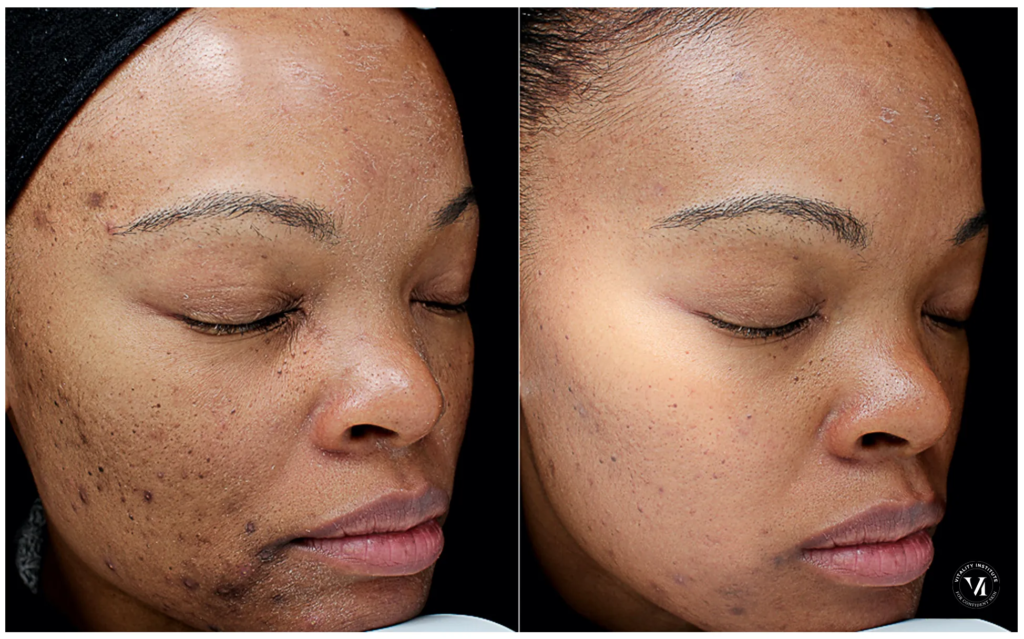
What Clears Skin Pigmentation?
Clearing skin pigmentation requires a comprehensive approach that includes both internal and external measures. Here are some strategies that can help clear skin pigmentation:
- Exfoliation: Regular exfoliation can help remove dead skin cells and promote cell turnover, leading to a more even complexion. Use gentle exfoliants, such as alpha hydroxy acids (AHAs) or enzymes, to avoid irritation.
- Skin-Lightening Ingredients: Look for skincare products that contain skin-lightening ingredients like vitamin C, kojic acid, niacinamide, or licorice extract. These ingredients can help fade pigmentation and promote a brighter complexion.
- Professional Treatments: Consider professional treatments such as chemical peels, laser therapy, or microdermabrasion. These treatments can target pigmented areas more intensively and help achieve faster results.
- Protective Measures: Prevent further pigmentation by wearing sunscreen daily, seeking shade, and using protective clothing and accessories. Sun protection is crucial in maintaining a clear and even complexion.
Remember that consistency and patience are key when addressing pigmentation. It may take several weeks or months to see significant improvements, depending on the severity of the pigmentation and the effectiveness of the chosen treatments.
Which Herb Is Good for Pigmentation?
Several herbs have been used traditionally to address pigmentation and promote a more even skin tone. One herb that stands out for its pigmentation-fighting properties is turmeric. Turmeric contains an active compound called curcumin, which has potent antioxidant and anti-inflammatory effects. These properties make turmeric effective in reducing pigmentation and promoting overall skin health.
To use turmeric for pigmentation, create a paste by mixing turmeric powder with milk or honey. Apply the paste to the affected areas of your face and leave it on for 20 minutes. Rinse off with lukewarm water and repeat this process two to three times a week for visible results.
While turmeric is generally safe to use, it can temporarily stain the skin with a yellowish tint. This can be easily removed with a gentle cleanser or toner. If you have any concerns or are allergic to turmeric, perform a patch test before applying it to your entire face.
How Can I Lighten My Pigmentation Fast?
While there are no overnight solutions for pigmentation removal, certain strategies can help lighten pigmentation more rapidly. Here are some tips to expedite the process:
- Skin-Lightening Serums: Incorporate skin-lightening serums into your skincare routine. Look for serums containing potent ingredients like vitamin C, kojic acid, or niacinamide. Apply them to the affected areas twice a day for accelerated results.
- Chemical Peels: Consider professional chemical peels, which involve the application of a chemical solution to the skin to exfoliate and remove pigmented cells. This treatment can help reveal brighter and more even skin.
- Laser Therapy: Laser treatments can target pigmented areas and break up melanin clusters, leading to faster pigmentation fading. Consult with a dermatologist to determine if laser therapy is suitable for you.
- Protective Measures: Prevent further pigmentation by consistently using sunscreen with a high SPF, seeking shade, and wearing protective clothing. Sun protection is vital in avoiding further darkening of pigmented areas.
Remember that fast results may vary depending on the severity of pigmentation and individual skin characteristics. It’s crucial to be patient, consistent with your chosen treatments, and maintain a comprehensive skincare routine for lasting results.
Can Ginger Cure Pigmentation?
Ginger is a versatile root known for its numerous health benefits. While it may not directly cure pigmentation, ginger can contribute to overall skin health and indirectly help reduce pigmentation. Ginger contains antioxidants and anti-inflammatory compounds that can help improve blood circulation, promote cellular regeneration, and support a healthier complexion.
To use ginger for skincare, you can create a DIY face mask or a ginger-infused toner. Here’s a simple recipe for a ginger face mask:
- Grate a small piece of ginger and extract the juice.
- Mix the ginger juice with honey or aloe vera gel to create a paste.
- Apply the paste to your face, focusing on the pigmented areas.
- Leave it on for 15-20 minutes, then rinse off with lukewarm water.
- Follow with your regular skincare routine.
Using ginger-infused toner can also provide antioxidant benefits. Simply steep sliced ginger in boiling water, let it cool, and strain the liquid. Transfer the ginger toner into a spray bottle and spritz it on your face after cleansing.
While ginger can contribute to healthier skin, it’s important to note that it may not eliminate pigmentation entirely. For significant and long-lasting results, consider incorporating ginger-based remedies into a comprehensive skincare routine that includes other pigmentation-fighting ingredients.
What Foods Should You Avoid for Hyperpigmentation?
Certain foods can exacerbate hyperpigmentation or trigger inflammatory responses in the skin. To minimize pigmentation, it’s advisable to avoid or limit the consumption of the following:
- Processed Foods: Highly processed foods often contain additives, preservatives, and artificial ingredients that can trigger inflammation and worsen pigmentation. Opt for whole, unprocessed foods whenever possible.
- Sugar: High sugar consumption can lead to the formation of advanced glycation end products (AGEs), which can contribute to pigmentation and premature aging. Reduce your intake of sugary foods and beverages for better skin health.
- Spicy Foods: Spicy foods, particularly those containing capsaicin, can dilate blood vessels and lead to facial flushing. This can exacerbate pigmentation and redness in individuals prone to these conditions.
- Citrus Fruits: Citrus fruits, such as lemons and oranges, contain natural acids that can sensitize the skin and make it more prone to pigmentation when exposed to sunlight. Be cautious when consuming citrus fruits and protect your skin from UV rays.
It’s important to note that individual reactions to certain foods may vary. If you suspect that a specific food worsens your pigmentation or skin condition, consider keeping a food diary to track any potential triggers.
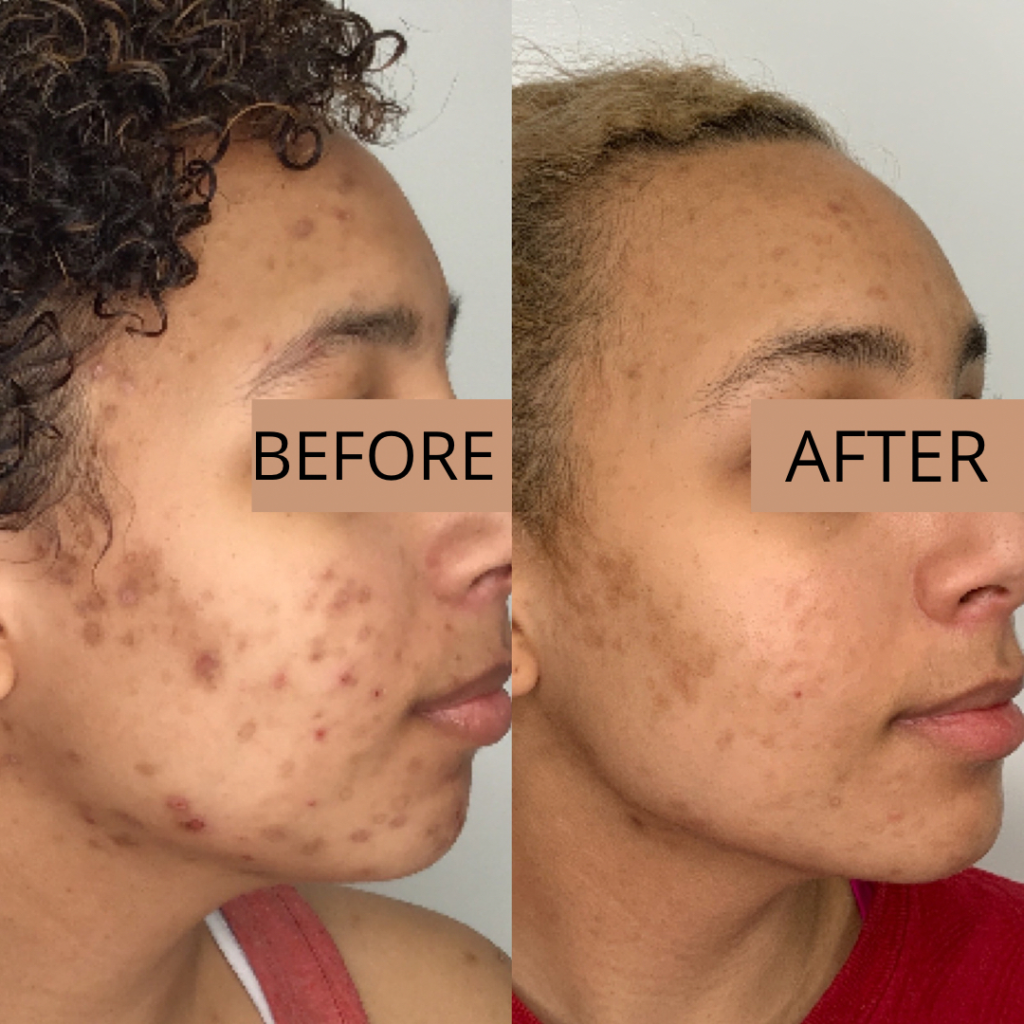
What Foods to Avoid for Face Pigmentation?
When dealing with face pigmentation, it’s beneficial to avoid or minimize the consumption of certain foods that can potentially exacerbate pigmentation issues. Here are some foods to consider avoiding:
- Fried and Greasy Foods: Foods high in unhealthy fats and oils can contribute to inflammation and skin issues, including pigmentation. Limit your intake of fried foods and opt for healthier cooking methods such as grilling or steaming.
- Dairy Products: Some individuals may be sensitive to dairy products, which can lead to hormonal imbalances and trigger pigmentation. If you suspect dairy as a potential trigger, consider reducing or eliminating it from your diet and monitor any changes in your skin.
- Alcohol: Excessive alcohol consumption can dehydrate the skin and impair its ability to heal and regenerate. It can also disrupt hormonal balance, leading to pigmentation issues. Practice moderation when consuming alcohol and ensure proper hydration.
- Artificial Food Additives: Certain food additives, such as artificial colors and flavors, can trigger inflammation and skin reactions in sensitive individuals. Opt for whole foods and minimize the consumption of processed and packaged products.
Remember that maintaining a balanced and nutritious diet is crucial for overall skin health. Focus on incorporating fresh fruits, vegetables, lean proteins, and whole grains into your meals to support a healthy complexion.
FAQs (Frequently Asked Questions)
Q: Is it possible to remove pigmentation from my face permanently at home?
A: While complete permanent removal of pigmentation may be challenging, consistent skincare practices, natural remedies, and lifestyle changes can significantly reduce pigmentation and promote a more even complexion.
Q: How long does it take to see results when using serums for pigmentation?
A: Results may vary depending on the severity of pigmentation and individual skin characteristics. It typically takes several weeks to months of consistent serum use to see noticeable improvements.
Q: Can I use cucumber alone to remove pigmentation?
A: Cucumber can provide temporary relief and hydration to the skin but may not be potent enough to completely remove pigmentation on its own. Combine cucumber with other remedies and a comprehensive skincare routine for best results.
Q: Are there any professional treatments available for pigmentation removal?
A: Yes, professional treatments like chemical peels, laser therapy, and microdermabrasion can target pigmented areas more intensively and provide faster results. Consult with a dermatologist or skincare professional for personalized recommendations.
Q: Are there any side effects of using ginger for pigmentation?
A: Ginger is generally safe to use topically; however, some individuals may experience skin irritation or allergic reactions. Perform a patch test before applying ginger to your entire face and discontinue use if any adverse reactions occur.
Q: How long does it take to lighten pigmentation fast?
A: Rapid pigmentation lightening may take several weeks to months, depending on the severity of pigmentation and the effectiveness of the treatments used. Consistency and adherence to a comprehensive skincare routine are crucial for optimal results.
Conclusion
Achieving a clear and even complexion requires a combination of skincare practices, natural remedies, and lifestyle changes. While complete permanent removal of pigmentation may not be possible, you can significantly reduce its appearance and promote healthier skin. Protect your skin from the sun, incorporate effective serums, and try natural ingredients like cucumber, turmeric, and fruits known for their skin-brightening properties. Consider professional treatments for more significant results. Additionally, maintain a healthy lifestyle, avoid trigger foods, and be patient throughout your pigmentation journey. With consistent effort and the right approach, you can restore your skin’s radiance and enjoy a more confident and vibrant appearance.
